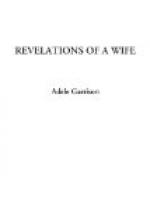INTRODUCTION
Probably it is true that no two persons entertain precisely the same view of marriage. If any two did, and one happened to be a man and the other a woman, there would be many advantages in their exemplifying the harmony by marrying each other—unless they had already married some one else.
Sour-minded critics of life have said that the only persons who are likely to understand what marriage ought to be are those who have found it to be something else. Of course most of the foolish criticisms of marriage are made by those who would find the same fault with life itself. One man who was asked whether life was worth living, answered that it depended on the liver. Thus, it has been pointed out that marriage can be only as good as the persons who marry. This is simply to say that a partnership is only as good as the partners.
“Revelations of a Wife” is a woman’s confession. Marriage is so vital a matter to a woman that when she writes about it she is always likely to be in earnest. In this instance, the likelihood is borne out. Adele Garrison has listened to the whisperings of her own heart. She has done more. She has caught the wireless from a man’s heart. And she has poured the record into this story.
The woman of this story is only one kind of a woman, and the man is only one kind of a man. But their experiences will touch the consciousness—I was going to say the conscience—of every man or woman who has either married or measured marriage, and we’ve all done one or the other.
Pierre RAVILLE.
Revelations of a Wife
I
“I will be happy! I will! I will!”
Today we were married.
I have said these words over and over to myself, and now I have written them, and the written characters seem as strange to me as the uttered words did. I cannot believe that I, Margaret Spencer, 27 years old, I who laughed and sneered at marriage, justifying myself by the tragedies and unhappiness of scores of my friends, I who have made for myself a place in the world’s work with an assured comfortable income, have suddenly thrown all my theories to the winds and given myself in marriage in as impetuous, unreasoning fashion as any foolish schoolgirl.
I shall have to change a word in that last paragraph. I forgot that I am no longer Margaret Spencer, but Margaret Graham, Mrs. Richard Graham, or, more probably, Mrs. “Dicky” Graham. I don’t believe anybody in the world ever called Richard anything but “Dicky.”
On the other hand, nobody but Richard ever called me anything shorter than my own dignified name. I have been “Madge” to him almost ever since I knew him.
Dear, dear Dicky! If I talked a hundred years I could not express the difference between us in any better fashion. He is “Dicky” and I am “Margaret.”




